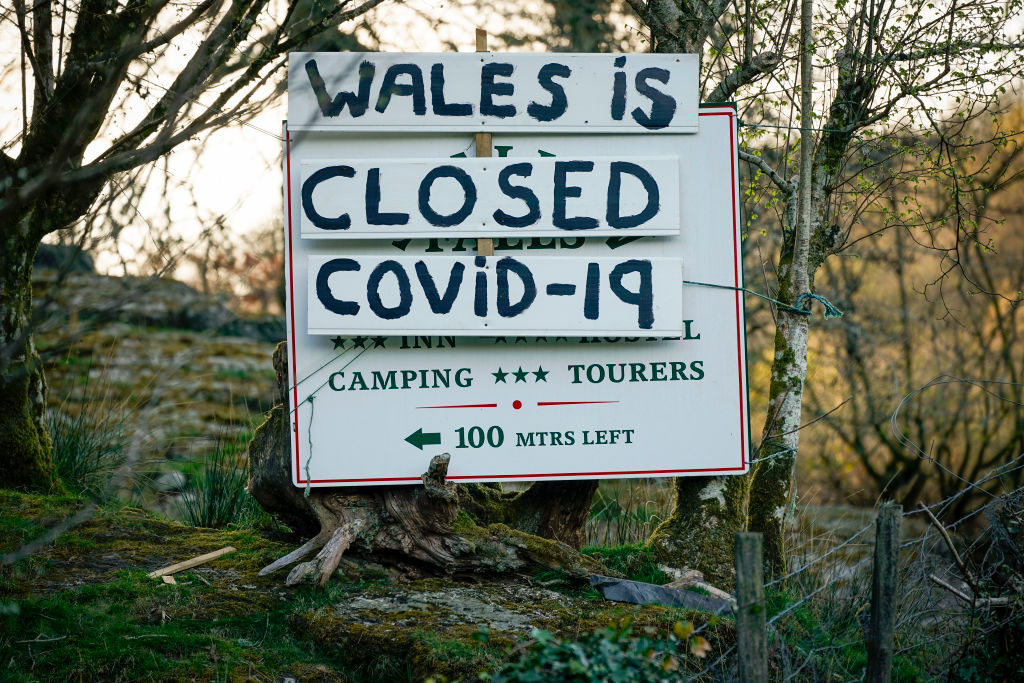Back in October, Wales implemented the ‘circuit breaker’ lockdown which was rejected by Boris Johnson on the grounds that these things are not long-term solutions. It’s hard to see what good it did Wales now: after a short-term dip, its Covid rates are now at least twice as high as anywhere else in the UK and seem to be spiralling out of control.
The situation is particularly concerning because Wales has been swift to impose strict measures in a bid to contain the situation. No one could venture that a lack of caution is to blame for what is unfolding in Wales. The country imposed its ‘firebreak lockdown’ for just over two weeks on 23 October; it was another week before a similar lockdown was announced by Boris Johnson for England.
First Minister Mark Drakeford has suggested that a refusal to follow the rules might be to blame. ‘Despite the very strict rules we have here in Wales, fatigue – people’s sense of no hope for the future – has meant that not everybody has been willing to abide by the restrictions that are still necessary,’ Drakeford said:
‘We have seen people having house parties, people inviting large numbers of people back to their own houses when that is absolutely not allowed within our rules…Most people in Wales do everything they can to abide by the rules but with coronavirus you only need a relatively small number of people who are not prepared to do that and you see the numbers flying up again.’
So is it right a minority of Welsh people who are content to flout the rules are to blame for what is happening? It would be surprising if so; Drakeford’s excuse that ‘fatigue’ has set in is surely not isolated to Wales. Instead, perhaps a willingness to blame others masks a refusal for the Welsh government to admit failure in their increasingly panicked response to Covid.
In the final week of the ‘firebreak’, reported case rates stood at 206 per 100,000 people. This fell over the next two weeks to 171. But by the end of November, the trajectory was upwards to 232; now it stands at a record 425 per 100,000 people. Some rate increases have been recorded in the last fortnight elsewhere in Northern Ireland, London and the east of England. But the rise in Wales dwarfs what is going on elsewhere. There is clearly something more going on than multiple house parties in Cardiff and Swansea.
As ever with Covid-19, the reasons are complex. First, we have to acknowledge that a firebreak lockdown has, at best, only a temporary effect on viral transmission. Unless we stay at home and isolate individually for weeks on end, we will come into contact with this virus, even during a lockdown.
Second, when people are concentrated in homes, many of which are small with little or no outside space, this could actually increase the risk of transmission. Have the lessons of spring and the first lockdown been learnt? Care homes were terribly affected and this was the group of people who stayed most indoors. This fact appears to have escaped those who advise our politicians.
Third, and perhaps the most difficult one for politicians to admit, are the structural problems within the Welsh health service. Here the health minister and others have some difficult questions to answer. Nosocomial (i.e. originating in hospital) spread of Covid increased by 50 per cent in the run up to the ‘firebreak’.
This is by no means a Wales-only problem but the rise is startling; old, crowded hospitals which have high percentage bed use and rapid turn-over are likely to be the main culprits. In the summer of 2019, Wales Online reported how hospital beds in Wales had been reduced to the lowest number (10,564 on average) since statistics were recorded in 1996-97 (when 15,582 were available). Bed occupancy had risen to well over 85 per cent – a sign that all was not well within Wales’ healthcare system. Dr Jo Mower, vice president of the Royal College of Emergency Medicine (RCEM) in Wales said at the time: ‘The link between high bed occupancy and declining hospital performance has been well-established.’
So a health service with even less capacity than the rest of the United Kingdom under Labour guidance in Wales has had to deal with a pandemic in which rules have been chopped and changed and the wisdom of lockdown has been unquestioned. The 17-day firebreak lockdown appears to have concentrated people in their homes, harbouring the virus and transmitting it to each other; when restrictions were relaxed, it then spread further. Hospitals, already under general winter pressure, have had further admissions and have little further capacity to cope. The situation is such that there is panic at the possible increased risk of socialisation at Christmas.
So who is to blame for what is unfolding in Wales? While Drakeford might like to deceive himself that house parties are responsible, this won’t do. The real reason is likely to be an under resourced health service and a short-term lockdown that appears to have done little to limit the spread of Covid-19.







Comments